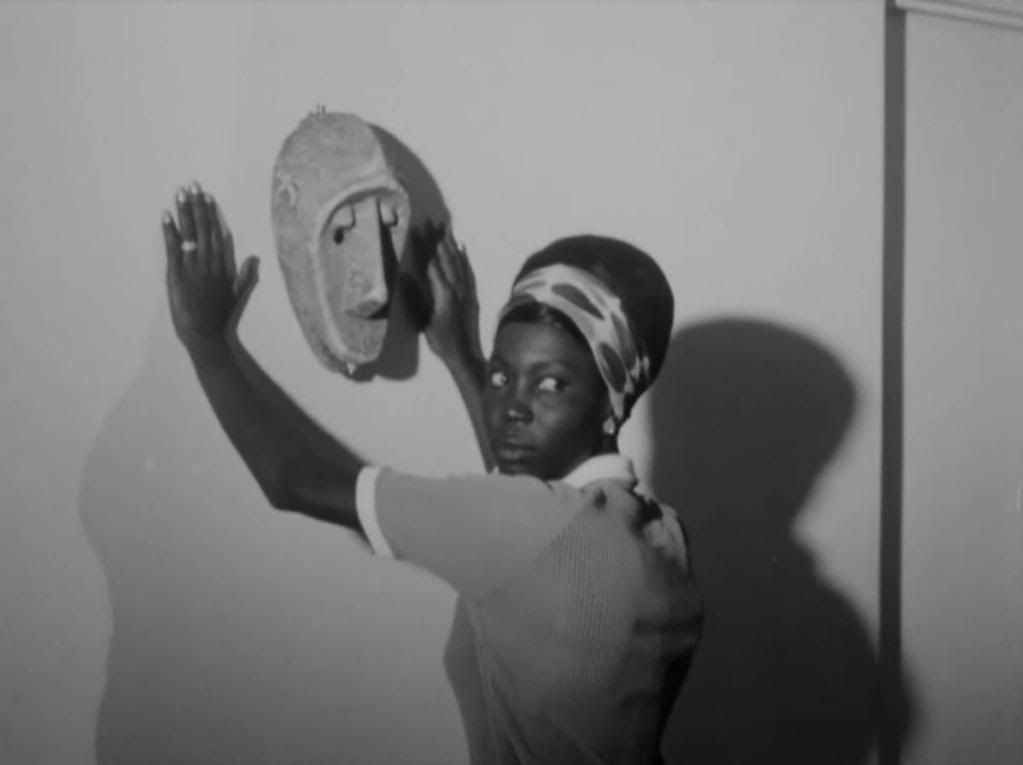
As the first feature film ever made by a black director in sub-Saharan Africa, Ousmane Sembene's 1966 debut Black Girl was a historical landmark, marking the novelist and fledgling filmmaker as the father of African film. At only an hour long, the film is a brisk, punchy, documentary-like examination of economic relations between black Africans and white Europeans, and the crises of identity that are caused by this state of being.
The film focuses on a young Senegalese woman named Diouana (Mbissine Thérèse Diop), who's hired as a governess for a white family (Anne-Marie Jelinek and Robert Fontaine) who are living in Dakar. When the family returns to France for a vacation, they bring Diouana back with them to their apartment on the Riviera, but she finds that the trip is not at all what she expected. Outside of Africa, where the family had relied on Diouana only to take care of the children, they now treat her with more naked contempt, parading her before their friends for her exoticism, asking her to cook and clean for them like a maid rather than a governess. The trip to France, which Diouana had been excited about, actually lays bare the true nature of her relationship with this family, a relationship that's more like slavery than a boss/employee dynamic.
Sembene brilliantly conveys the disconnection that Diouana feels in relation to her employers. Diouana barely speaks to them, her words instead relegated to a running internal monologue in which she registers her complaints and her thoughts about her situation, never giving voice to these ideas aloud. The lack of communication is an important thread in the film, as Diouana has no outlet for the ideas running through her head. She questions her very sense of self, unsure of what her place is in this family or in this unfamiliar country, and yet she has no one she can speak with, no one with whom she can share her experiences. The communication here is strictly one-way, with the whites barking orders at her, telling her what she can and can't do and what they need her to do for them, but Diouana remains blankly silent despite her active inner life.

Language barriers and the lack of literacy prevent true communication. When she receives a letter from her mother, Diouana can't respond herself because she can't write, so her white employers write the letter for her, inventing generic responses for their servant, while Diouana feels alienated from the whole process — especially since she knows her mother can't write either, which means that someone else wrote the letter for her, as well. What should be a channel of communication between mother and daughter is instead mediated by others on both ends so that the letter becomes just another form of alienation.
Sembene films Diouana's disheartening, restricted existence in stark, plain black-and-white, crisp and straightforward, with not a trace of ornamentation. There are many closeups with the young woman staring into or just past the camera as her internal monologue narrates her thoughts. The style is rough and casually realistic, but it suits the material well. Sembene renders the apartment where Diouana spends all her time in France as a blank, boring place with mostly undecorated walls, except for the African mask that Diouana gave her employers and which serves as a symbol of their surface appreciation and appropriation of African culture, as well as a reminder of Diouana's distance from her home. The sense of claustrophobia is palpable.
This is a powerful debut, dark and uncompromising in its portrait of a young African woman's increasing hopelessness. Sembene unsurprisingly portrays the white French as clueless and nasty, but despite the caricatures, the source of Diouana's suffering is actually quite subtle and multi-faceted. It arises from a general sense that she's being used, slotted into a system that's an echo of slavery, subjected to the sexualized glances of white men and the petty demands of white women, called lazy and only praised for her "exotic" cooking, denied any time or place of her own. It's an intense and affecting film, abruptly veering into tragedy at the end, offering no escape. Interesting, Sembene doesn't end things there but lets the story continue with a fascinating, richly ambiguous coda in which the white employers are forced to confront the results of their behavior.

3 comments:
Interesting review. I'm looking forward to this movie.
Oh yes this is an amazing film. Saw it several years ago in a print as it played in Chicago. Loved it and would like to see it again. Nice treatment of it here Ed.
Sembene is indeed the father of the African film, and this is indeed a dark and uncompromising debut film of disconnection and class disparity with understandable pointed criticism of colonial dominance, in a trenchant examination of post-colonial identity. I'd certainly rate this with MOOLAADE, XALA and CAMP DE THIAROYE as one of the four masterworks by an artist whose cultural prominence is as renowned in literature as it is in film.
You again peel away the gauze to craft a definitive examination on this essential work of world cinema.
Post a Comment